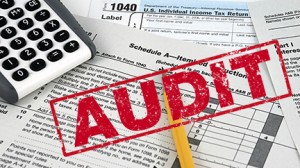
Tax Audit? Don’t Panic
Well, the annual tax mania is over once again. Now you can sit back and relax. Unless, of course, you are one of those that the IRS singles out for an audit. Less than 1 percent of the tax-paying public gets that experience, but it can be unnerving.
Audits are what have given the tax agency its ogre-ish reputation and generated visions of torture and merciless browbeating by suit-clad agents.
Here’s how to address an audit if it happens:
To begin with, an innocent looking letter from the IRS, arriving by U.S. mail, should be taken seriously. Don’t ignore it. Failure to respond almost always triggers escalating pressure from the taxing agency. Better to have your tax accountant respond, if possible. Experts in such matters suggest you never try to deal with an audit on your own. Not many run-of-the-mill taxpayers have the expertise to deal with the figures and the myriad laws that surround them.
Often, the experienced tax experts can spot the difficulty in a return at a glance and resolve it without a hassle. Simply determining which office within the IRS has initiated the audit will reveal the problem.
The experts advise that you never speak to the IRS representatives yourself.
Be prepared to provide whatever substantiating information is necessary to resolve issues. Keeping detailed records throughout the year is the starting point. Small businesses, in particular, need to be certain that personal and business finances are not intertwined.
The statute of limitations on an audit is three years, although the IRS can request an audit up to six years if there is reason to believe there have been substantial misrepresentations on the return. That means you must keep the relevant materials for at least that long. Receipts, pay stubs and other items used in preparing your return should be safely filed away until there is no longer reason to believe you might be audited. Most experts suggest a seven-year period before you toss the information.
The information you provide in response to an audit is filed via Form 4564. It can be delivered to a tax agency in person or mailed. Ask for a face-to-face meeting between your representative and an agent if you feel it is necessary to explain particular items in your return. Mail audits can be time-consuming.
How long an audit takes depends on the complexity of your tax situation – and how many other taxpayers the auditor is dealing with. Generally, a taxpayer has 30 days in which to respond after receipt of an audit notice, and the process then proceeds depending on the particulars. If the conclusion is that you did not pay enough taxes, payment plans can be set up, if necessary. If you don’t feel satisfied with the result of your audit, you can ask for a review.
And there is always the possibility that the audit will find that the government has overcharged you. A little sweetening of the return is ample payment for the consternation you may feel when the word “audit” pops up.